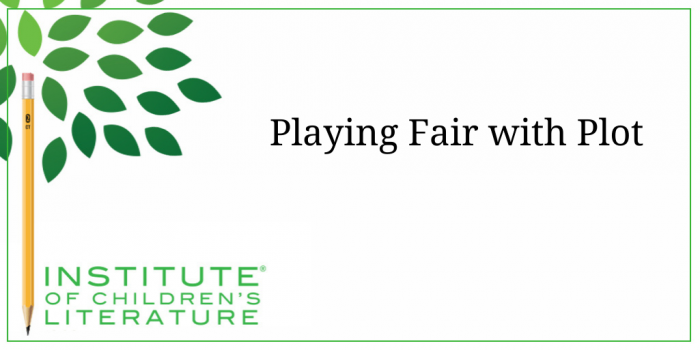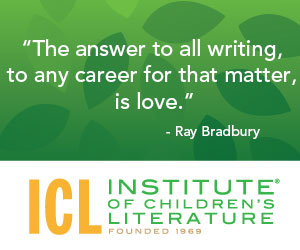1000 N. West Street #1200, Wilmington, DE 19801
© 2024 Direct Learning Systems, Inc. All rights reserved.

We teach our students how to write and get published!
View our Course Catalog >

Unfair Endings
Consider this plot synopsis: Joe wanted a bicycle more than anything. More than he wanted to go to Super Fun World. More than he wanted to get to stay up late and watch scary movies. More even than he wanted a really cool superpower. Because a bicycle would be real. So he begged, which didn’t work and annoyed his parents. He put “bike” on his birthday list four times, but when his birthday came around he got new shoes and a board game instead. He even tried doing chores to make money for a bike, but after working a few weekends, he calculated that he would have to pick up sticks out of Mr. Myers yard for about 423 years to make enough for a bike. So finally he gave up. He would never get a bike, ever. Then his grandparents came to visit with a late birthday present for Joe: a bike! Yay.
On the surface, this might look pretty good. Joe clearly wants something and wants it really badly. The synopsis makes that very clear. And Joe is not a passive character (because passive characters have a lot of trouble engaging readers.) He tries several different things to get what he wants, but he wants something pretty big. And it’s probably outside his ability to just make it happen. So the writer has decided that what Joe needs is someone to help him out. After all, he’s a good kid and he has been willing to try to work for his goal. So, the writer brings in the grandparents for the save.
The problem with this is that it doesn’t play fair with the reader. If the grandparents were going to bring him a bike all along, this synopsis renders all of Joe’s acts as pointless. He could have done totally different actions and gotten the exact same result because the result isn’t dependent on Joe. It undermines his job as main character and just hands the reader and ending that doesn’t grow out of the actions that come before it. And that doesn’t play fair with the reader who doesn’t just want to see Joe get a bike, they want to see Joe deserve the bike he gets. “But,” you might say, “his grandparents only knew that Joe wanted a bike because he made his desire clear though the birthday list, so he did bring it about – right?” Unfortunately, no, because his greatest efforts (working) is completely pointless and that robs the reader and Joe.
We Love Hard Workers
Readers cheer for characters who work hard to accomplish something. In fact, readers will even get behind a character who works really hard for a goal that isn’t exactly honorable. (This is why some kids, when read Don’t Let the Pigeon Drive the Bus, will say that he should be allowed to drive. Even though we know pigeons shouldn’t drive buses. But the kids respond to how hard the pigeon works to get a chance to drive that bus.) This is also why sometimes audiences will feel bad for a really hard-working villain when he doesn’t get what he wants, even though we recognize the goal is really not good. Generally, people think those who work hard should get what they pursue. It’s part of our desire to see things as “fair.”
Keeping that in mind can help a writer craft a really strong plot that will get readers engaged and cheering for your main character, and give a feeling of satisfaction to the ending. Your characters need to work for their endings. But also, their endings need to grow out of their work.
Surprise Endings
Let’s consider a genre where it can be really hard to do this: a mystery. Mystery plots work best when the ending is a surprise for the reader. And that often means you have to hide a lot from the reader as the plot unfolds. But it can also make it tempting to render the main character’s actions unimportant. For instance, look at this mystery plot synopsis: Henry’s birthday finally arrives and he wants to spend the day with his forest friends. So the little hedgehog washes his face and combs his quills and packs a basket of goodies to share with his friends. He goes first to Daisy’s house, but the little duckling isn’t home. He finds a note on her table with a mysterious message. Has something terrible happened to Daisy? He grabs the note and runs to his friend Baxter’s den, but the bear cub isn’t home. All Henry finds is a trail of honey drips. Has something happened to Henry as well? He follows the trail until the dribbles trail off. Henry is in a panic. He has to find his friends. He runs to Ollie’s tree. Ollie will help him find Daisy and Baxter, and the owl is sure to be home since he sleeps all day in his tree, but the hollow in the tree is empty. Finally Henry, footsore and sad, trudges home only to find all his friends there with a surprise birthday party.
Now, there is some real potential to this story. We have disappearances and worry on Henry’s part. He is active in trying to solve the mystery. But the mystery isn’t solved until he gives up and goes home. And at the point, the solution pops up and surprises Henry. This is a lovely happy ending, but it is completely unrelated to what came before it. Henry doesn’t solve the mystery. His actions don’t affect it at all. And that’s not how plot works. That’s not fair to Henry or the reader.
The Solution
So how does the author solve that? By making the character’s actions matter. In the case of Joe and his bike, we could have Joe realize that he’ll never make enough money for a new bike, but perhaps he could make enough for a used bike? Or maybe he could organize a neighborhood kid’s yard sale, and discover a bike that he can easily buy with the combination of what he made at the yard sale and what he made picking up sticks––and maybe he even has enough left over to buy a bike bell or something like that. This would let the result be realistic, but it would also let it grow out of the actions Joe makes in pursuit of his dream.
But what about the tougher problem: making fair endings in mysteries. Again it comes down to making Henry’s actions meaningful and necessary. For instance, what if the note Henry found at Daisy’s house made him think of Baxter. And then he found a clue caught in the gooey honey on Baxter’s floor that made him think of Ollie. Then he finds something at Ollie’s house that makes him think the “kidnappers” might be heading to his house. So Henry runs home to save his friends, only to find the surprise party. And his friends are so relieved to see him as they didn’t know where he could be. By making little changes, we have the ending happen because of Henry’s actions. He didn’t create the party, but he only got home in time for the party because of the clues he followed. With some tinkering you might be able to come up with the plot that is even more closely linked to Henry’s actions.
Playing fair means the story doesn’t work without the actions of the main character. And that’s an essential part of good story building, whether for novels for teens or picture books for young children. The characters need to feel essential to the story and the things that happen in it. And when you play fair, everyone who reads your work ends up a winner.
With over 100 books in publication, Jan Fields writes both chapter books for children and mystery novels for adults. She’s also known for a variety of experiences teaching writing, from one session SCBWI events to lengthier Highlights Foundation workshops to these blog posts for the Institute of Children’s Literature. As a former ICL instructor, Jan enjoys equipping writers for success in whatever way she can.
1000 N. West Street #1200, Wilmington, DE 19801
© 2024 Direct Learning Systems, Inc. All rights reserved.
1000 N. West Street #1200, Wilmington, DE 19801
© 2024 Direct Learning Systems, Inc. All rights reserved.
1000 N. West Street #1200, Wilmington, DE 19801
© 2024 Direct Learning Systems, Inc. All rights reserved.
1000 N. West Street #1200, Wilmington, DE 19801
© 2024 Direct Learning Systems, Inc. All rights reserved.

1000 N. West Street #1200, Wilmington, DE 19801
© 2025 Direct Learning Systems, Inc. All rights reserved.

1000 N. West Street #1200, Wilmington, DE 19801
©2025 Direct Learning Systems, Inc. All rights reserved. Privacy Policy.